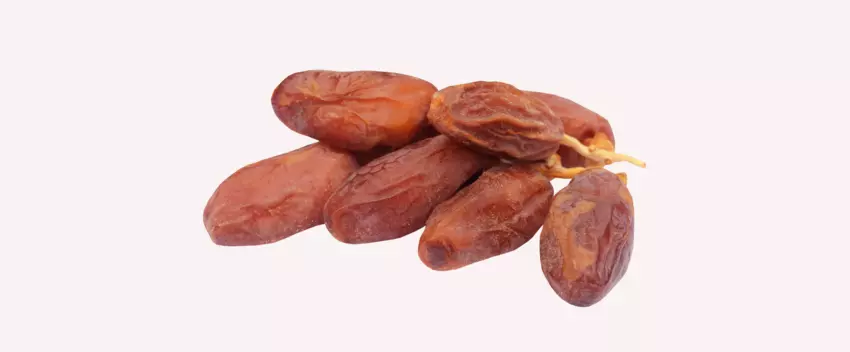Can Dogs Eat Dates?
- 11 Sep 2023
- 4m read

At Butternut Box, we understand the importance of feeding your furry friends only the best. When it comes to exploring what's safe and healthy for your pup, questions about various human foods often arise. One such question is, "can dogs eat dates?" In this guide, we'll delve into the world of dates and their suitability for your beloved four-legged friend.
Are Dates Good for Dogs?
Dates can have a multitude of benefits for dogs, when fed in very small quantities due to their high sugar content.
Nutrient-rich
Dates are naturally rich in essential nutrients, including vitamins such as vitamin B6 and vitamin K, as well as minerals like potassium and magnesium. These can contribute to your dog's overall health and well-being.
Energy boost
The natural sugars in dates provide a quick energy boost, making them a great option for active dogs or as a reward during training sessions.
Digestive health
Dates contain dietary fibre, which can aid in promoting healthy digestion in dogs. However, it's crucial to ensure that you don't offer too many dates, as excessive fibre intake can lead to digestive upset.
Antioxidants
Dates also contain antioxidants, which can help combat oxidative stress and support your dog's immune system. Antioxidants play a role in maintaining overall health and preventing diseases.
How Many Dates Can I Give My Dog?
Feeding your dog dates can be a delightful experience for both you and your pet, but it's crucial to understand the right portion size. When it comes to dates, they can be a healthy treat when given in moderation. These sweet fruits are packed with vitamins and minerals, but they're also calorie-dense.
As a general guideline, it's best to offer dates as an occasional treat and limit the quantity to a couple pieces at a time. Remember, the key is moderation to ensure your dog's overall health.
Why Do Dogs Like Dates?
Your dog's affection for dates might leave you wondering what makes them so appealing. Dogs are known for their keen sense of smell and taste, and dates offer a combination of sweetness and chewiness that many dogs find irresistible.
The natural sugars in dates provide a burst of energy, making them a tempting treat for your furry friend. While their love for dates is understandable, it's essential to remember that these sweet morsels should be offered sparingly to prevent any potential digestive issues or excessive calorie intake.
Things to Consider Before Feeding Dates to Your Dog
Before introducing dates into your dog's diet, there are some essential factors to consider.
Allergies and sensitivities
Dogs, like humans, can have allergies or sensitivities to certain foods. While dates are generally safe for most dogs, it's wise to introduce them gradually and monitor your dog for any adverse reactions. If you notice any unusual symptoms like upset stomach, vomiting, or diarrhoea, stop feeding dates immediately.
Pit removal
Dates come with pits, which can pose a choking hazard or cause digestive problems if ingested by your dog. Always make sure to remove the pit before offering a date to your furry friend. Choking hazards are not something to be taken lightly, and your pet's safety is of the utmost importance.
High sugar content
Dates are naturally sweet, and their sugar content, while healthy in moderation, can lead to weight gain if overindulged. At Butternut Box, we believe in providing balanced and nutritious meals for dogs. Keep an eye on the number of dates your dog consumes to maintain their ideal weight.
Portion size
As mentioned earlier, moderation is key. The ideal portion size will depend on your dog's size and dietary needs. Consult with your veterinarian to determine the appropriate amount of dates to include in your pet's diet.
Alternative healthy treats
While dates can be a delicious and nutritious treat, there are plenty of other options available for your dog's snacking pleasure. At Butternut Box, we advocate for natural and healthy alternatives like fresh fruits and vegetables, such as apple slices, carrots, and blueberries, which can be equally enjoyable for your pup.

.webp)


